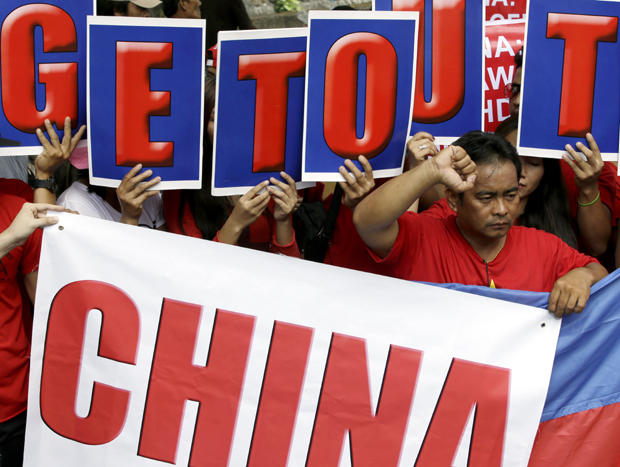
In this May 16, 2014 file photo, Vietnamese expatriates and Filipinos display placards as they join together in a rally in front of the Chinese Consulate at the financial district of Makati city to protest the recent moves by China to construct an oil rig near the Vietnamese-claimed Paracels off the contested Spratlys group of islands and shoals in the South China Sea. Policymakers in most Asian countries support a robust US role in the region even though many expect China to become the most dominant power, a survey said Thursday, June 5. AP
WASHINGTON– Policymakers in most Asian countries support a robust US role in the region even though many expect China to become the most dominant power, a survey said Thursday.
An 11-nation survey of experts, who are not in government but are seen as influential, found strong backing in almost every country except China for President Barack Obama’s stated policy of “pivoting” US resources toward Asia.
The study by the Washington-based Center for Strategic and International Studies found that elites largely expected China’s clout to keep growing. But asked what would be best for their countries, wide majorities in the United States as well as its regional partners Australia, Japan, South Korea and Taiwan chose continued US leadership, even if Washington’s power declines in relative terms.
Elites in Southeast Asia and India preferred international cooperation, with marginal numbers even in China itself saying that Beijing’s supremacy would be in their countries’ best interest.
Japan, whose relationship with China has been deteriorating, was the most enthusiastic about a dominant US position. Only two percent of Japanese experts said that China played a positive role in regional security and 83 percent expected Japan’s most important economic relationship in a decade to be with the United States, even though China is already Japan’s largest trading partner.
On the other end of the spectrum, Southeast Asian nations preferred a “quiet, persistent presence” by the United States, said Bonnie Glaser, a China expert at the center.
Southeast Asians appreciate the US commitment to freedom of navigation amid tensions with Beijing in the South China Sea, but “they really don’t want to see confrontation and friction between the United States and China,” Glaser said at the release of the survey.
No Chinese ‘hubris’
One surprise in the survey was in China itself, where 71 percent of experts predicted that the United States would be the dominant power in East Asia in 2024–more than said so in any other country, including even the United States.
The finding “really gives the lie, if you will, to this notion that all Chinese are just brimming with hubris and assertiveness and aggressiveness,” said Christopher Johnson, another China expert at the center and a former CIA analyst.
Johnson said that the survey reflected a shift from the 2008 economic crisis, when many Chinese predicted a steep US decline, as well as growing doubts within China on whether it can sustain growth.
The survey reflects the views of elites, not government officials or the public. Chinese President Xi Jinping has called for a new form of relationship with the United States and has been seen as increasingly assertive in challenging Japan, Vietnam and the Philippines at sea.
An outlier in the survey was Thailand, which is a long-standing US ally. Some 89 percent of Thai experts said that China would exert the most power in East Asia in 10 years and fewer than 10 percent said that continued US leadership was in their country’s best interest– views sharply different to those in other US allies.
Ernie Bower, the center’s chair of Southeast Asia studies, said that the Thai elite’s attitudes reflected disappointment with the US response to the 1997 Asian financial crisis and its brief sanctioning of the kingdom over a 2006 military coup.
The survey was conducted in March and April, before the Thai military’s latest coup that has triggered strong US criticism.
India was the only Asian nation other than Japan where more expected the United States rather than China to be its top economic partner. Only nine percent of experts in India, which has a long-running border dispute with China, said that Beijing had a positive impact on regional security.–Shaun Tandon
RELATED STORIES
China bent on pushing ‘expansion agenda’—DFA chief
US: China tensions bad for Asia business